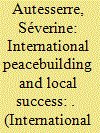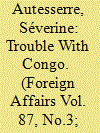| Srl | Item |
| 1 |
ID:
152816


|
|
|
|
|
| Summary/Abstract |
Existing research on war and peace lacks analysis of what allows peacebuilding to succeed at the subnational level. Instead, most scholars focus on peacebuilding failure and macro-level dynamics. This is unfortunate because the obstacles to peacebuilding are such that the most puzzling question is why international efforts sometimes succeed, rather than why they fail. The lack of focus on success is also problematic because it results in ambiguous findings. On the one hand, there is an emerging consensus that local conflict resolution is crucial to building peace. There is also an agreement that, all else being equal, international support tends to increase the chances of successful peacebuilding. On the other hand, when international actors have tried to back local initiatives, they have often generated counterproductive consequences and worsened the situation. Should international actors support local peacebuilding processes? If so, how can they actually do this?
|
|
|
|
|
|
|
|
|
|
|
|
|
|
|
|
| 2 |
ID:
143789


|
|
|
|
|
| Summary/Abstract |
Prevention was the most important dimension of the Responsibility to Protect's foundational documents and subsequent advocacy efforts. However, the actual implementation of protection on the ground has focused on reacting to crises. This article develops a case study of war resumption in Congo in 2008 to understand why and how this happened. International peacebuilders took preventive action in Congo, but not as part of the protection efforts. Peacebuilders focused on preventing renewed national and regional wars, and they ignored the local conflicts that fuelled these broader tensions. The reason for this lies in a dominant culture of international peacebuilding. This culture shaped international efforts in such a way that the three essential conditions for effective prevention – political will, early warning and the preventive toolbox – were present for the prevention of renewed national and regional fighting but absent for the prevention of local violence. The resulting strategy allowed a crisis localized in the province of North Kivu to escalate into a full-scale war. The same type of effect appears generalizable across several recent interventions.
|
|
|
|
|
|
|
|
|
|
|
|
|
|
|
|
| 3 |
ID:
080844


|
|
|
|
|
| Publication |
2008.
|
| Summary/Abstract |
Although the war in Congo officially ended in 2003, two million people have died since. One of the reasons is that the international community's peacekeeping efforts there have not focused on the local grievances in eastern Congo, especially those over land, that are fueling much of the broader tensions. Until they do, the nation's security and that of the wider Great Lakes region will remain uncertain
|
|
|
|
|
|
|
|
|
|
|
|
|
|
|
|
| 4 |
ID:
106203


|
|
|
|
|
| Publication |
2011.
|
| Summary/Abstract |
The trouble with the Congo suggests a new explanation for international peacebuilding failures in civil wars. Drawing from more than 330 interviews and a year and a half of field research, it develops a case study of the international intervention during the Democratic Republic of Congo's unsuccessful transition from war to peace and democracy (2003-2006). Grassroots rivalries over land, resources, and political power motivated widespread violence. However, a dominant peacebuilding culture shaped the intervention strategy in a way that precluded action on local conflicts, ultimately dooming the international efforts to end the deadliest conflict since World War II. Most international actors interpreted continued fighting as the consequence of national and regional tensions alone, and diplomats and United Nations staff viewed intervention at the macro level as their only legitimate responsibility. The dominant culture constructed local peacebuilding as such an unimportant, unfamiliar, and unmanageable task that neither shocking events nor resistance from certain individuals could convince international actors to reevaluate their understanding of violence and intervention. Through this in-depth analysis, The trouble with the Congo proposes innovative ways to address civil wars in Africa and beyond.
|
|
|
|
|
|
|
|
|
|
|
|
|
|
|
|